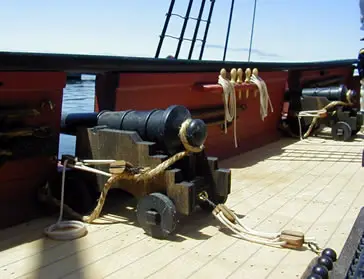An unpredictable person or thing, liable to cause damage if not kept in check by others.
Loose cannon
What's the meaning of the phrase 'Loose cannon'?
What's the origin of the phrase 'Loose cannon'?
From the 17th century to the 19th century, wooden warships carried cannon as their primary offensive weapons. In order to avoid damage from their enormous recoil when fired they were mounted on rollers and secured with rope. A loose cannon was just what it sounds like, that is, a cannon that had become free of its restraints and was rolling dangerously about the deck.
As with many nautical phrases, the use of ‘loose cannon’ owes something to the imagination as no evidence has come to light to indicate that the phrase was used by sailors in the days that ships actually carried cannon. The imagination in question belonged to Victor Hugo who set the scene in the novel Ninety Three, 1874. A translation of the French original describes cannon being tossed about following a violent incident onboard ship:
“The carronade, hurled forward by the pitching, dashed into this knot of men, and crushed four at the first blow; then, flung back and shot out anew by the rolling, it cut in two a fifth poor fellow… The enormous cannon was left alone. She was given up to herself. She was her own mistress, and mistress of the vessel. She could do what she willed with both.”
Henry Kingsley picked up this reference in his novel Number Seventeen, 1875, in which he made the first use of the term ‘loose cannon’ in English:
“At once, of course, the ship was in the trough of the sea, a more fearfully dangerous engine of destruction than Mr. Victor Hugo’s celebrated loose cannon.”
The earliest figurative use of ‘loose cannon’ in print that I can find is from The Galveston Daily News, December 1889:
The negro vote in the south is a unit now mainly because it is opposed by the combined white vote. It would in no event become, as Mr. Grady once said, “a loose cannon in a storm-tossed ship.”
The phrase might have dwindled into obscurity in the 20th century but for the intervention of the US president Theodore Roosevelt. William White was a noted US journalist and politician around the turn of the 20th century and was a close friend of Roosevelt. White’s Autobiography, published soon after his death in 1944 contained the following reminiscence:
He [Roosevelt] said: “I don’t want to be the old cannon loose on the deck in the storm”.
As I suggested, nautical terms are rife with romanticism and another term in which items are imagined to be rolling about the deck of a sailing ship (incorrectly in this case) is ‘cold enough to freeze the balls off a brass monkey‘.
See other Nautical Phrases.
See other phrases that were coined in the USA.
The history of “Loose cannon” in printed materials
Trend of loose cannon in printed material over time
Related articles
Related phrases and meanings
Browse more Phrases
About the Author

Phrases & Meanings
A-Z
A B C D E F G H I J K L M N O P Q R S T UV W XYZ
Categories
American Animals Australian Bible Body Colour Conflict Death Devil Dogs Emotions Euphemism Family Fashion Food French Horses ‘Jack’ Luck Money Military Music Names Nature Nautical Numbers Politics Religion Shakespeare Stupidity Entertainment Weather Women Work
How did we do?
Have you spotted something that needs updated on this page? We review all feedback we receive to ensure that we provide the most accurate and up to date information on phrases.
